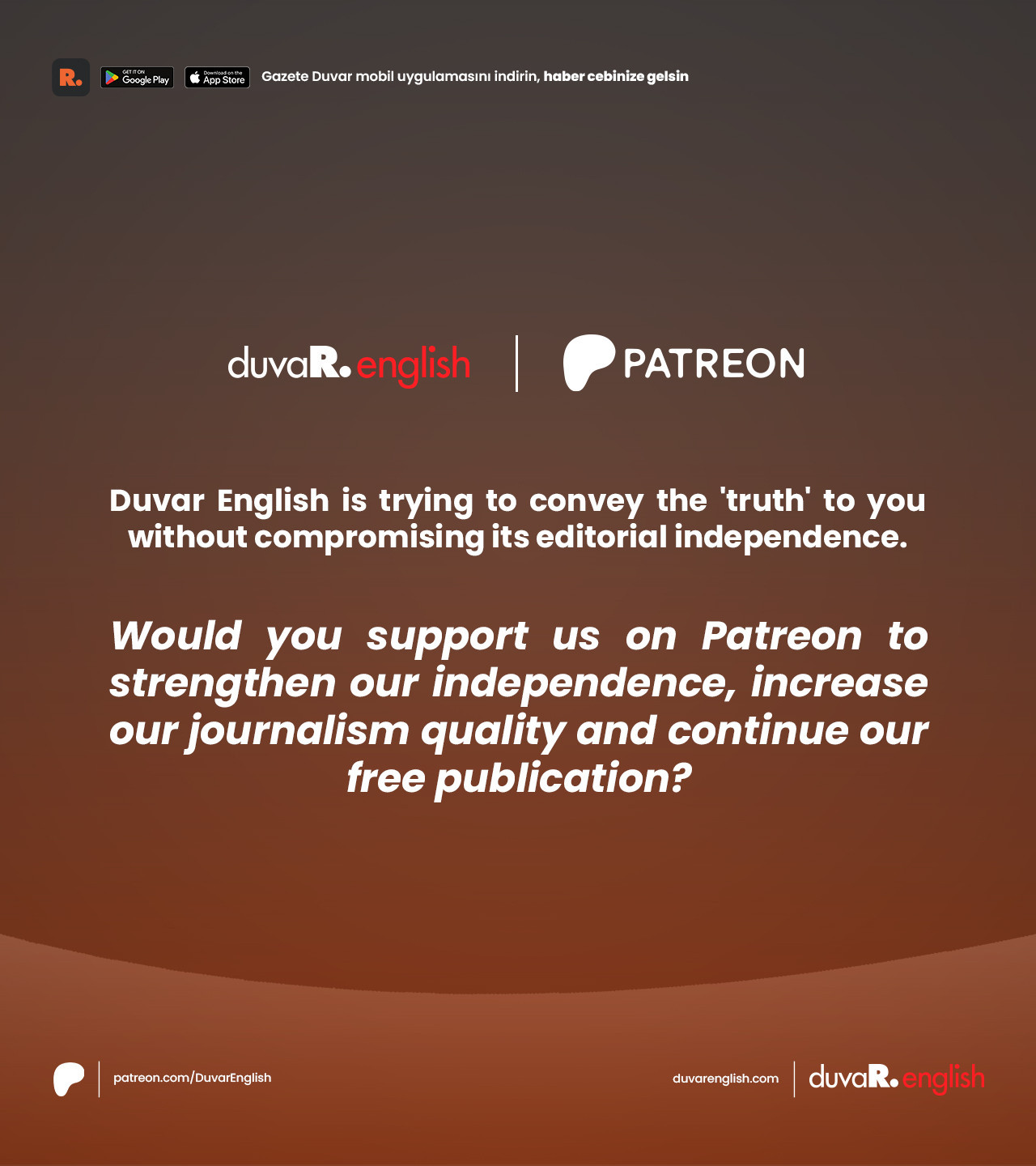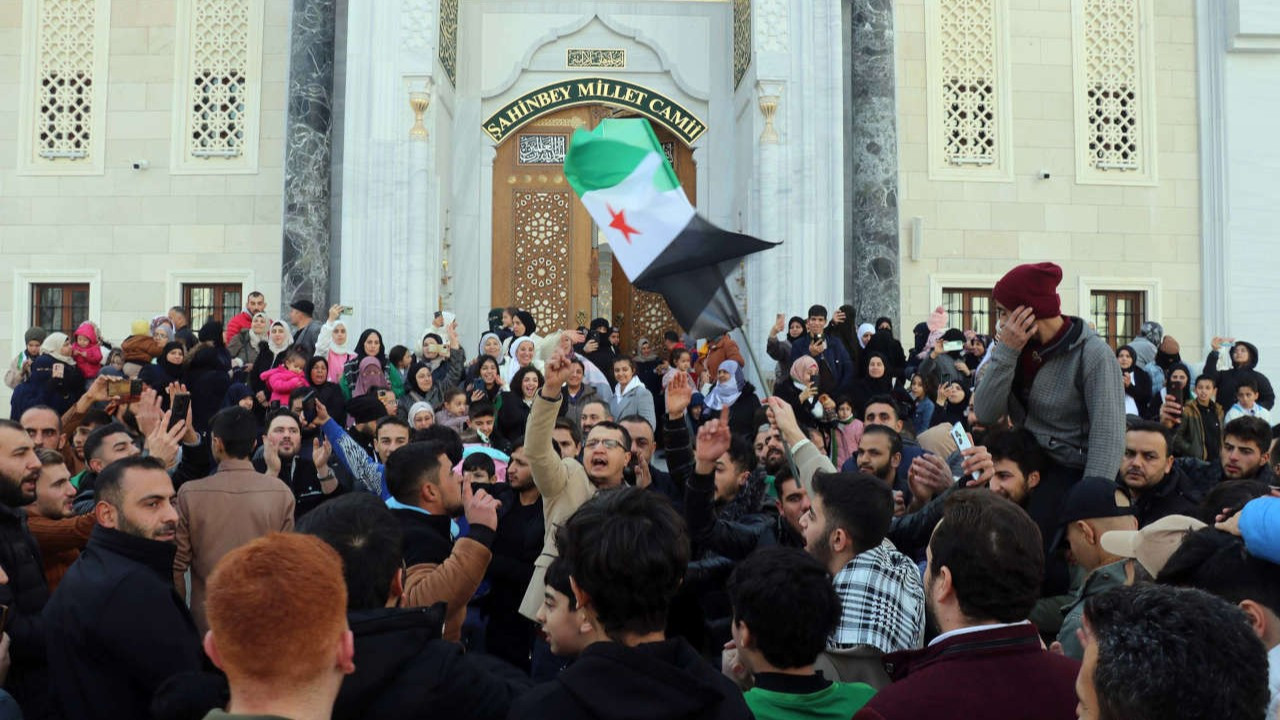Syria in the aftermath of Assad: 'There are 3 big winners’
Commenting on the recent developments in Syria, Middle East analyst Aron Lund said Turkey and Israel, as two of the three big winners, were facing some serious risks and problems as well.
Selay Dalaklı / DUVAR
Following the offensive launched by the jihadist groups led by Hayat Tahrir al-Sham (HTS) against the Syrian army on Nov. 27 and the ensuing ouster of Bashar al-Assad in 12 days with Damascus now controlled by the jihadists, many have been surprised, especially given that everything happened so quickly. What will happen next in Syria and what role actors such as Turkey will play in this picture are still very much discussed.
Middle East analyst Aron Lund, commenting on how the ouster of Assad unfolded so quickly, referred to the loss of Aleppo as a key event and says, “At the end of the day, no one loved Assad, and when it became clear that he would neither be able to reward loyal supporters nor punish defectors, no one wanted to fight for him.”
Noting that Iran and Russia must have realized that there was just very little they could do, Lund indicated that Russia and Iran are the biggest losers and Turkey, Qatar and Israel are the big winners in this picture, with Turkey and Israel also facing some risks and problems. As for the Kurds in Syria, Lund commented, “There’s just no way for the Syrian Democratic Forces to survive long term without a foreign patron that can keep Turkey at bay.”
We have talked with Aron Lund, a fellow with Century International and a Middle East analyst at the Swedish Defense Research Agency (FOI), about the recent developments in Syria and what will happen next.
Syrian Army and its 'ghost soldiers'

The jihadist groups led by the HTS launched attacks on the Syrian army starting from Nov. 27. They took control of Damascus in 12 days and Assad fled the country. Why do you think they chose this particular time for the offensive? Why do you think everything happened so quickly, apparently with almost no resistance from the Syrian army?
What happened in Syria is an absolutely exceptional series of events, unexpected by everyone - certainly including myself. We still don’t know all the details of what happened.
The key event was the regime’s loss of Aleppo, in record time. From that point on, everything just crumbled.
So what happened in Aleppo? That’s for Syrian historians to find out. But it appears that a jihadist-led push toward the city, which likely had more limited initial goals, simply blew through the defenses and sent regime forces fleeing.
There could be many reasons for that, including, of course, good preparations and planning by the rebels, a bit of luck, and perhaps defections or assassinations in regime ranks, and so on.
Overall, however, the government’s problem was that its forces just turned and fled. On paper, they should have been able to at least delay the rebel advance. The Syrian military was weakened by years of war and by the severe economic crisis that has afflicted Syria since about 2019. Some of the war-time manpower had been demobilized, likely as a way to cut costs and reduce social tensions. Even for the forces still in place, we can safely assume that most units were below their official strength. Corruption is rampant in Syria, and there are reports that much of the frontline manpower was just not there. They were “ghost soldiers,” who only existed on paper to let their superiors draw a salary, or who had bribed their way out of service to go work other jobs instead, since the military could not pay them a living wage.
Even so, the forces in and around Aleppo should have been able to put up more resistance. It’s a huge city and there were thousands of people in army ranks. But they could not, because they would not - they just fled. And once they fled and lost Aleppo, and then Hama, and so on, the question in everyone else’s mind became very simply. Why should I sacrifice my life to save a regime that seems to be crumbling anyway? At the end of the day, no one loved Assad, and when it became clear that he would neither be able to reward loyal supporters nor punish defectors, no one wanted to fight for him.
‘I don't buy the line that Russia and Iran deliberately abandoned Assad'
To be sure, Assad’s allies were not a present as he would have needed them to be. That’s also an important part of the background. Iranian and Hezbollah forces were distracted and made ineffective by the war in Lebanon, and by Israeli bombing raids in Syria. Iran-led forces were historically responsible for some positions around Aleppo, and their disappearance or ineffectiveness may have left holes in the city defenses that the insurgents could exploit.
Russia had, as we know, shifted its focus to Ukraine. It still had assets in Syria and still helped bomb the advancing rebels, but not enough.
I don’t buy the line that Russia and Iran deliberately abandoned Assad - not until it became clear that they would not be able to save him. I think they simply could not muster the forces needed in the extremely short time available. It was a question of a few days, at most, before it was too late. Their last intervention, in 2015, took months to organize. Even a much smaller effort would have taken time, given the constraints - their shortage of resources, Israel’s policing of Iranian actions, and so on.
Quite early on, the Russian and Iranian leaders must have realized that there was just very little they could do. Organizing a serious intervention would take some time, if it were even possible, but Assad’s army was already melting away. You can’t support an army that doesn’t fight.
There was obviously also a failure of leadership on many levels, including the highest one. At a moment when the army is in panic and the regime is dissolving, a president’s first task should be to appear before his supporters and show that he’s not fleeing - he’s still leading the fight. When morale is breaking, that’s what he needs to address. But Assad did nothing and said nothing, except for some general statements via press release. His actions, or rather his inaction, must have contributed greatly to the sense of a leaderless, failing regime and to the panic that spread in loyalist ranks.
'Assad's ouster is an utter disaster for Iran'
When we talk about Syria, we know that there are also other regional and international players involved, such as Russia, Iran, the US and Turkey, to name a few. Israel is now also militarily involved in Syria, perhaps more than it has been for a long time. How do you see the role of these countries in Syria before and after Dec. 8?
No one expected this, and everyone is now busily trying to reposition themselves. Turkey, Qatar, and Israel are the big winners, with great opportunities before them. But Turkey and Israel also face serious risks and problems, and will need to dedicate a lot of time and resources to Syria going forward. Both countries would almost certainly have preferred a different outcome, had we asked them a few weeks ago, but they will now make the most of the situation.
Stability and Syria’s coherence as a nation and a state is on the minds of many, for good reason. No one particularly likes the group that has now seized power, or its leader, Ahmed al-Sharaa, formerly known under his nom de guerre Abu Mohammed al-Golani. But I think many will nevertheless want to work with his new government, simply because their primary fear is institutional collapse - permanent state failure. Even a hardcore Islamist government will seem better than that, to many regional leaders. It’s simple pragmatism. Regional states were, ultimately, prepared to accept Assad’s regime as a fact of life, and now they’ll accept Sharaa’s regime the same way.
But of course, there are limits to what regional states can accept in terms of radical Islamism, the hosting of foreign jihadis, and such.
Turkey and Qatar won’t mind much. The governments in Ankara and Doha have a high tolerance for Islamism, to put it mildly. But nations like Israel, Egypt, Jordan, and the United Arab Emirates are very wary of the risk that Syria turns into a permanent base for regional Islamist activism. Iraq is not at all happy about having Sunni jihadi groups on its border once again, even though the situation is very different from the Islamic State crisis in 2014. And Lebanon will be very intimately affected by Syria’s transformation.
The two biggest losers are Iran and Russia. It’s possible - not necessarily likely, but possible - that Russia can negotiate some form of solution that lets it keep its bases on the Syrian coast. For Iran, however, Assad’s ouster is an utter disaster, a strategic failure of the first order. It’s made worse by the fact that it follows several other defeats by Iran and Iran-backed forces in the Middle East since 2023. It will force a rethink in Tehran, and I think many are now nervously looking for signs that Iran will seek a nuclear bomb to shore up its failing deterrence.
With the jihadist groups led by the HTS taking control of Damascus, the conflict seems to end, except for the one between Turkey-backed Syrian National Army (SNA) and the YPG/SDF. There are reports that SNA has now also taken control of Manbij after Tal Rifaat. What do you think the future holds for Syrian Kurds and where do you see Turkey and perhaps the US in this picture?
The future for the Syrian Democratic Forces is bleak, very bleak. Turkey and the Syrian National Army factions will seize as much of their territory as they can, grabbing all of the land evacuated by Russian monitors and their Assad government allies. Territories protected by the United States will need a different approach, and will probably be put off until next year. But the overall weakening of the Kurdish movement in Syria may be such that these territories, too, are destabilized.
'No way for SDF to survive long term without a foreing patron'
Ultimately, much depends on U.S. policy choices. Donald Trump previously wanted to leave Syria, but we don’t know which path he’ll take in his second term. A weakening of the Syrian Democratic Forces and of Iran’s presence may add more weight to the arguments for leaving Syria, as will the agreements already concluded with Iraq to remove U.S. troops from there. On the other hand, the risk of an Islamic State resurgence and the chaos engulfing the Middle East more generally could make the U.S. government see merits in staying.
Ultimately, though, it’s all up to Trump.
Should the United States leave Syria, the Kurdish autonomy is doomed. The Syrian Democratic Forces’ PKK connection is a guarantee for perpetual hostility with Turkey and the armed groups in thrall to Ankara. There’s just no way for the Syrian Democratic Forces to survive long term without a foreign patron that can keep Turkey at bay.
We see that especially the leader of the HTS has been giving rather unexpected moderate messages about how things will move forward in Syria. How credible do you find these statements? What do you think will happen in Syria now and in the near future? How possible do you think normalization is with other Middle Eastern countries and the West?
The new HTS-led government clearly places a high priority on normalizing with other countries and gaining diplomatic recognition.
'U.S. and European leaders seem to play a risky gamble'
To establish any form of credible, functional central government, HTS will need to get the economy working. That involves having sanctions lifted, which U.S. and European leaders have not been willing to do yet. They’re trying to leverage the sanctions to force HTS to make concessions, which, to me, seems like a risky gamble.
The new rulers in Damascus also need to have something done about their own terrorism designation, since that comes with its own set of sanctions.
Last but certainly not least, they need to find a way to resume the import of oil and wheat and other products that were previously supplied by Iran and Russia. Failing to do so will pull the rug out from under the Syrian state and generate a massive social and economic crisis. It’s the kind of thing that could break even a functional and existing government. It could very easily smother a weak, emerging regime like that of Sharaa and HTS, which has only tenuous control over the territories it claims to govern.
All of these things require a good working relationship with the international community, and with Western countries especially - the United States first of all.
That is probably an important explanation for HTS’s recent charm offensive, even though it’s not the only explanation. Ahmed al-Sharaa’s messaging is also directed toward his fellow Syrians, many of whom have apprehensions about his group and its ideology. He needs to work on many fronts simultaneously to avert conflicts and crises. At least for the moment, displaying a moderate and friendly face is a good way of doing that.
Before the HTS’s offensive began, there had been talks in Turkey signalling a desired normalization with the Syrian government and Assad. With Assad apparently no longer in the picture, what do you think Turkey-Syria relations will look like in the new period?
Turkey will probably have excellent ties with any new government in Damascus, reflecting years of support for the anti-Assad insurgency and also the fact that Syria’s new rulers will need Ankara’s support.
From a Turkish point of view, the problem is not so much HTS being a jihadist faction. The main risk is, rather, that the jihadist capture of Damascus will turn out to be the prelude to a wider national implosion.
'It would be a Mogadishu of the Mediterranean'
Unless HTS manages to gain a firm grip on the state apparatus and put the economy back on track, quickly, Syria’s central state could wither. It would leave the country carved up by feuding militias and foreign actors to an even greater degree than we’ve seen during the past decade-plus of war.
For Turkey, this would not be a good outcome at all. It would be a Mogadishu on the Mediterranean, a black hole of problems and violence, pushing refugees north toward the border on a permanent basis. In such a situation, it would be a small comfort that, like in the real-world Mogadishu, Ankara would have influence over whatever regime rules Damascus.
So staving off state failure is likely to be Turke’s priority number one, two, and three - and that requires helping HTS connect with Western and Arab governments.
Of course, for Turkey, much also depends on the fate of the northeast. But in that case, we will probably have to wait for Donald Trump to take office until we have a clearer view of the way ahead.
*The views expressed in this interview are the personal views of Aron Lund; they are not expressed in representation or on behalf of Century International or the FOI.


 Two rival strategies for Kurds in new SyriaWorld
Two rival strategies for Kurds in new SyriaWorld